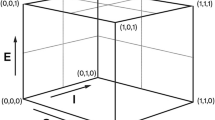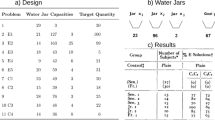Abstract
The classic Aesop’s fable, Crow and the Pitcher, has inspired a major line of research in comparative cognition. Over the past several years, five articles (over 32 experiments) have examined the ability of corvids (e.g., rooks, crows, and jays) to complete lab-based analogs of this fable, by requiring them to drop stones and other objects into tubes of water to retrieve a floating worm (Bird and Emery in Curr Biol 19:1–5, 2009b; Cheke et al. in Anim Cogn 14:441–455, 2011; Jelbert et al. in PLoS One 3:e92895, 2014; Logan et al. in PLoS One 7:e103049, 2014; Taylor et al. in Gray R D 12:e26887, 2011). These researchers have stressed the unique potential of this paradigm for understanding causal reasoning in corvids. Ghirlanda and Lind (Anim Behav 123:239–247, 2017) re-evaluated trial-level data from these studies and concluded that initial preferences for functional objects, combined with trial-and-error learning, may account for subjects’ performance on key variants of the paradigm. In the present paper, we use meta-analytic techniques to provide more precise information about the rate and mode of learning that occurs within and across tasks. Within tasks, subjects learned from successful (but not unsuccessful) actions, indicating that higher-order reasoning about phenomena such as mass, volume, and displacement is unlikely to be involved. Furthermore, subjects did not transfer information learned in one task to subsequent tasks, suggesting that corvids do not engage with these tasks as variants of the same problem (i.e., how to generate water displacement to retrieve a floating worm). Our methodological analysis and empirical findings raise the question: Can Aesop’s fable studies distinguish between trial-and-error learning and/or higher-order causal reasoning? We conclude they cannot.

Similar content being viewed by others
References
Bates D, Maechler M, Bolker B, Walker S (2015) Fitting linear mixed-effects models using lme4. J Stat Softw 67:1–48. https://doi.org/10.18637/jss.v067.i01
Bird CD, Emery NJ (2009a) Insightful problem solving and creative tool modification by captive nontool-using rooks. Proc Natl Acad Sci 106:10370–10375. https://doi.org/10.1073/pnas.0901008106
Bird CD, Emery NJ (2009b) Rooks use stones to raise the water level to reach a floating worm. Curr Biol 19:1–5. https://doi.org/10.1016/j.cub.2009.07.033
Cheke LG, Bird CD, Clayton NS (2011) Tool-use and instrumental learning in the Eurasian jay (Garrulus glandarius). Anim Cogn 14:441–455. https://doi.org/10.1371/journal.pone.0040574
Cheng P (1997) From covariation to causation: a causal power theory. Psychol Rev 104:367–405
Domjan M (1983) Biological constraints on instrumental and classical conditioning: Implications for general process theory. Psychol Learn Motivat 17:215–277
Dunlap AS, Stephens DW (2014) Experimental evolution of prepared learning. Proc Natl Acad Sci 111:11750–11755. https://doi.org/10.1073/pnas.1404176111
Garcia J, Koelling RA (1966) Relation of cue to consequence in avoidance learning. Psychonom Sci 4:123–124
Ghirlanda S, Lind J (2017) ‘Aesop’s fable’ experiments demonstrate trial-and-error leaning in birds, but no causal understanding. Anim Behav 123:239–247. https://doi.org/10.1016/j.anbehav.2016.10.029
Hunt GR (2014) Vice-anvil use in nut processing by two Corvus species. N Z Journal of Zool 41(1):68–76. https://doi.org/10.1080/03014223.2013.809368
Jelbert SA, Taylor AH, Cheke LG, Clayton NS, Gray RD (2014) Using the Aesop’s Fable paradigm to investigate causal understanding of water displacement by New Caledonian crows. PLoS One 3:e92895. https://doi.org/10.1371/journal.pone.0092895
Jelbert SA, Taylor AH, Gray RD (2015) Investigating animal cognition with the Aesop’s Fable paradigm: Current understanding and future directions. Communicat Integr Biol 8:e1035846. https://doi.org/10.1080/19420889.2015.1035846
Logan CJ (2016) Behavioral flexibility and problem solving in an invasive bird. Peer J 4:e1975. https://doi.org/10.7717/peerj.1975
Logan CJ, Jelbert SA, Breen AJ, Gray RD, Taylor AH (2014) Modifications to the Aesop’s Fable paradigm change New Caledonian crow performances. PLoS One 7:e103049. https://doi.org/10.1371/journal.pone.0103049
Logan CJ, Harvey BD, Schlinger BA, Rensel M (2015) Western scrub-jays do not appear to attend to functionality in Aesop’s Fable experiments. Peer J 4:e1707. https://doi.org/10.7717/peerj.1707
Penn DC, Povinelli DJ (2007) On the lack of evidence that chimpanzees possess anything remotely resembling a ‘theory of mind’. Philosophical Trans R Soc B 362:731–744
Penn DC, Holyoak KJ, Povinelli DJ (2008) Darwin’s mistake: Explaining the discontinuity between human and nonhuman minds. Behav Brain Sci 31:109–178
Povinelli DJ (2011) World without weight: Perspectives on an alien mind. Oxford University Press, Oxford
Raudenbush SW, Bryk AS (2002) Hierarchical linear models: applications and data analysis methods, vol 1. Sage Publications, Thousand Oaks
Rutz C, Sugasawa S, van der Wal JEM, Klump BC, St. Clair JJH (2016) Tool bending in New Caledonian crows. R Soc Open Sci. https://doi.org/10.1098/rsos.160439
Shettleworth SJ (1998) Cognition, evolution and behavior. Oxford University Press, Oxford
Shettleworth SJ (2009) The evolution of comparative cognition: is the snark still a boojum? Behav Process 80:210–217. https://doi.org/10.1016/j.beproc.2008.09.001
Shettleworth SJ (2012) Modularity, comparative cognition, and human uniqueness. Philos Trans R Soc B 367:2794–2802
Taylor AH (2014) Corvid cognition. Cognit Sci 5:361–372. https://doi.org/10.1002/wcs.1286
Taylor AH, Gray RD (2009) Animal cognition: Aesop’s Fable flies from fiction to fact. Curr Biol 19:R713–R732. https://doi.org/10.1016/j.cub.2009.07.055
Taylor AH, Elliffe DM, Hunt GR, Emery NJ, Clayton NS, Gray RD (2011) New Caledonian crows learn the functional properties of novel tool types. PLoS ONE 12:e26887. https://doi.org/10.1371/journal.pone.0026887
Timberlake W (1993) Behavior systems and reinforcement: an integrative approach. J Exp Anal Behav 60:105–128
Tolman EC (1932) Purposive behavior in animals and men. The Century co, New York
Weir AAS, Chappell J, Kacelnik A (2002) Shaping of hooks in New Caledonian crows. Science 297:981. https://doi.org/10.1126/science.1073433
Wickham H, Chang W (2015) An implementation of the grammar of graphics. http://ggplot2.org. Accessed 14 Feb 2018
Author information
Authors and Affiliations
Corresponding authors
Ethics declarations
Conflict of interest
Laura Hennefield, Hyesung G. Hwang, Sara J. Weston, and Daniel J. Povinelli declare that they have no conflicts of interest.
Human and animal rights statement
This article does not contain any studies with animals performed by any of the authors.
Electronic supplementary material
Below is the link to the electronic supplementary material.
Rights and permissions
About this article
Cite this article
Hennefield, L., Hwang, H.G., Weston, S.J. et al. Meta-analytic techniques reveal that corvid causal reasoning in the Aesop’s Fable paradigm is driven by trial-and-error learning. Anim Cogn 21, 735–748 (2018). https://doi.org/10.1007/s10071-018-1206-y
Received:
Revised:
Accepted:
Published:
Issue Date:
DOI: https://doi.org/10.1007/s10071-018-1206-y




